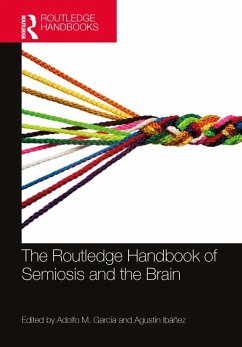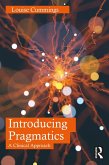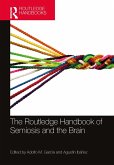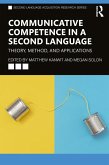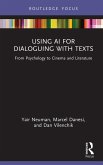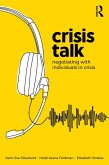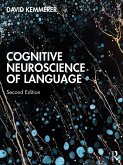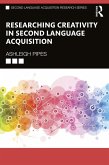The Routledge Handbook of Semiosis and the Brain (eBook, PDF)
Redaktion: García, Adolfo M.; Ibáñez, Agustín
44,95 €
44,95 €
inkl. MwSt.
Sofort per Download lieferbar

22 °P sammeln
44,95 €
Als Download kaufen

44,95 €
inkl. MwSt.
Sofort per Download lieferbar

22 °P sammeln
Jetzt verschenken
Alle Infos zum eBook verschenken
44,95 €
inkl. MwSt.
Sofort per Download lieferbar
Alle Infos zum eBook verschenken

22 °P sammeln
The Routledge Handbook of Semiosis and the Brain (eBook, PDF)
Redaktion: García, Adolfo M.; Ibáñez, Agustín
- Format: PDF
- Merkliste
- Auf die Merkliste
- Bewerten Bewerten
- Teilen
- Produkt teilen
- Produkterinnerung
- Produkterinnerung

Bitte loggen Sie sich zunächst in Ihr Kundenkonto ein oder registrieren Sie sich bei
bücher.de, um das eBook-Abo tolino select nutzen zu können.
Hier können Sie sich einloggen
Hier können Sie sich einloggen
Sie sind bereits eingeloggt. Klicken Sie auf 2. tolino select Abo, um fortzufahren.

Bitte loggen Sie sich zunächst in Ihr Kundenkonto ein oder registrieren Sie sich bei bücher.de, um das eBook-Abo tolino select nutzen zu können.
This handbook introduces neurosemiotics, a pluralistic framework to reconsider semiosis as an emergent phenomenon at the interface of biology and culture.
- Geräte: PC
- ohne Kopierschutz
- eBook Hilfe
- Größe: 74.78MB
Andere Kunden interessierten sich auch für
![Introducing Pragmatics (eBook, PDF) Introducing Pragmatics (eBook, PDF)]() Louise CummingsIntroducing Pragmatics (eBook, PDF)36,95 €
Louise CummingsIntroducing Pragmatics (eBook, PDF)36,95 €![The Routledge Handbook of Semiosis and the Brain (eBook, ePUB) The Routledge Handbook of Semiosis and the Brain (eBook, ePUB)]() The Routledge Handbook of Semiosis and the Brain (eBook, ePUB)44,95 €
The Routledge Handbook of Semiosis and the Brain (eBook, ePUB)44,95 €![Communicative Competence in a Second Language (eBook, PDF) Communicative Competence in a Second Language (eBook, PDF)]() Communicative Competence in a Second Language (eBook, PDF)29,95 €
Communicative Competence in a Second Language (eBook, PDF)29,95 €![Using AI for Dialoguing with Texts (eBook, PDF) Using AI for Dialoguing with Texts (eBook, PDF)]() Yair NeumanUsing AI for Dialoguing with Texts (eBook, PDF)20,95 €
Yair NeumanUsing AI for Dialoguing with Texts (eBook, PDF)20,95 €![Crisis Talk (eBook, PDF) Crisis Talk (eBook, PDF)]() Rein Ove SikvelandCrisis Talk (eBook, PDF)30,95 €
Rein Ove SikvelandCrisis Talk (eBook, PDF)30,95 €![Cognitive Neuroscience of Language (eBook, PDF) Cognitive Neuroscience of Language (eBook, PDF)]() David KemmererCognitive Neuroscience of Language (eBook, PDF)81,95 €
David KemmererCognitive Neuroscience of Language (eBook, PDF)81,95 €![Researching Creativity in Second Language Acquisition (eBook, PDF) Researching Creativity in Second Language Acquisition (eBook, PDF)]() Ashleigh PipesResearching Creativity in Second Language Acquisition (eBook, PDF)36,95 €
Ashleigh PipesResearching Creativity in Second Language Acquisition (eBook, PDF)36,95 €-
-
-
This handbook introduces neurosemiotics, a pluralistic framework to reconsider semiosis as an emergent phenomenon at the interface of biology and culture.
Dieser Download kann aus rechtlichen Gründen nur mit Rechnungsadresse in A, B, BG, CY, CZ, D, DK, EW, E, FIN, F, GR, HR, H, IRL, I, LT, L, LR, M, NL, PL, P, R, S, SLO, SK ausgeliefert werden.
Produktdetails
- Produktdetails
- Verlag: Taylor & Francis
- Seitenzahl: 430
- Erscheinungstermin: 14. November 2022
- Englisch
- ISBN-13: 9781000728736
- Artikelnr.: 65847865
- Verlag: Taylor & Francis
- Seitenzahl: 430
- Erscheinungstermin: 14. November 2022
- Englisch
- ISBN-13: 9781000728736
- Artikelnr.: 65847865
Adolfo M. García specializes in the neuroscience of language and communication. He serves as Director of the Cognitive Neuroscience Center (UdeSA, Argentina), Senior Atlantic Fellow at the Global Brain Health Institute (UCSF, USA), Associate Researcher at USACH (Chile), Director of Language Science at Redenlab, and Researcher at CONICET (Argentina). Dr. García leads research projects in more than ten countries across the globe. He has more than 200 publications, including works in top ten journals. His scientific contributions have been recognized by various awards and distinctions. Agustín Ibáñez works on global approaches to dementia and social, cognitive, and affective neuroscience. He is Director of the Latin American Brain Health Institute (BrainLat) and Full Professor at the CSCN (Universidad Adolfo Ibáñez, Chile); and Associate Research Professor and Group Leader of Predictive Brain Health Modelling Group (TCD, Ireland). Dr Ibáñez has over 300 publications, including works in top ten journals. His intense work has helped Latin American translational neuroscience by establishing a framework to engage scientists through internships, workshops, master's and PhD programs, organizing educational activities for the health community, and focusing on cognitive neuroscience, among others.
Acknowledgements
Semiosis, brain, and context: The unmet need for a transdisciplinary
framework (A. M. García & A. Ibáñez)
PART 1: PROLEGOMENA TO NEUROSEMIOTICS
1. Neurosemiotics: A brief history of its development and key concerns (K.
Kull & D. Favareau)
2. Steps to a semiotic cognitive neuroscience (T. Deacon)
3. An active inference approach to semiotics: A variational theory of signs
(A. Milette-Gagnon, S. P. L. Veissière, K. J. Friston, & M. J. D. Ramstead)
4. Experimental semiotics: Past, present, and future (J. Nölle & B.
Galantucci)
5. Beyond the human animal: Towards a cross-species neurosemiotics (M.
Tønnessen)
PART 2: LANGUAGE AND ITS PATHWAYS TO MEANING
6. Neural bases of multimodal semantics (M. Visser)
7. Embodied mechanisms and the shaping of semantics (G. Buccino)
8. The figurative brain (V. Cuccio)
9. Pharmacological modulation of meaning attribution (E. Tagliazucchi)
10. How grammar means (M. de Vega)
11. Discourse and the brain: Capturing meaning in the wild (N. Riccardi &
R. H. Desai)
12. Words, meanings, and the bilingual brain (N. del Maschio, J. Abutalebi,
& D. Perani)
13. How do sign languages mean? (R. Campbell)
PART 3: THE NEUROSEMIOTICS OF SOCIAL DYNAMICS
14. Empathy, meaning, and the human brain (K. Lehmann & P. Kanske)
15. Biological bases of moral cognition and their role in the construal of
meaning (S. Baez)
16. The neurosemiotics of social interaction: Insights from second-person
neuroscience (L. Schilbach)
17. Joint epistemic engineering: The neglected process in human
communication (A. Stolk, J. Banáková, & I. Toni)
18. Towards a neurosemiotics of friendship (C. Emmeche)
19. Neurosemiotics and ideology: A linguistic view (A. Lukin & D. Butt)
20. The interplay of culture, religion, and biology (J. Y. Sasaki & H. I.
Pearson)
PART 4: FURTHER SEMIOTIC DOMAINS
21. What makes us human? Face identity recognition (B. Rossion)
22. Musical signs and the human organism (A. M. Belfi)
23. The meaning of tools: The pragmatic value of semantic knowledge (F.
Osiurak, J. Baumard, C. Merck, & M. Lesourd)
24. Interpreting the signals within: Meaning and prediction during
interoception (R. Smith & S. S. Khalsa)
25. The hierarchical semantics of self (G. Northoff & D. Gorini)
Semiosis, brain, and context: The unmet need for a transdisciplinary
framework (A. M. García & A. Ibáñez)
PART 1: PROLEGOMENA TO NEUROSEMIOTICS
1. Neurosemiotics: A brief history of its development and key concerns (K.
Kull & D. Favareau)
2. Steps to a semiotic cognitive neuroscience (T. Deacon)
3. An active inference approach to semiotics: A variational theory of signs
(A. Milette-Gagnon, S. P. L. Veissière, K. J. Friston, & M. J. D. Ramstead)
4. Experimental semiotics: Past, present, and future (J. Nölle & B.
Galantucci)
5. Beyond the human animal: Towards a cross-species neurosemiotics (M.
Tønnessen)
PART 2: LANGUAGE AND ITS PATHWAYS TO MEANING
6. Neural bases of multimodal semantics (M. Visser)
7. Embodied mechanisms and the shaping of semantics (G. Buccino)
8. The figurative brain (V. Cuccio)
9. Pharmacological modulation of meaning attribution (E. Tagliazucchi)
10. How grammar means (M. de Vega)
11. Discourse and the brain: Capturing meaning in the wild (N. Riccardi &
R. H. Desai)
12. Words, meanings, and the bilingual brain (N. del Maschio, J. Abutalebi,
& D. Perani)
13. How do sign languages mean? (R. Campbell)
PART 3: THE NEUROSEMIOTICS OF SOCIAL DYNAMICS
14. Empathy, meaning, and the human brain (K. Lehmann & P. Kanske)
15. Biological bases of moral cognition and their role in the construal of
meaning (S. Baez)
16. The neurosemiotics of social interaction: Insights from second-person
neuroscience (L. Schilbach)
17. Joint epistemic engineering: The neglected process in human
communication (A. Stolk, J. Banáková, & I. Toni)
18. Towards a neurosemiotics of friendship (C. Emmeche)
19. Neurosemiotics and ideology: A linguistic view (A. Lukin & D. Butt)
20. The interplay of culture, religion, and biology (J. Y. Sasaki & H. I.
Pearson)
PART 4: FURTHER SEMIOTIC DOMAINS
21. What makes us human? Face identity recognition (B. Rossion)
22. Musical signs and the human organism (A. M. Belfi)
23. The meaning of tools: The pragmatic value of semantic knowledge (F.
Osiurak, J. Baumard, C. Merck, & M. Lesourd)
24. Interpreting the signals within: Meaning and prediction during
interoception (R. Smith & S. S. Khalsa)
25. The hierarchical semantics of self (G. Northoff & D. Gorini)
Acknowledgements
Semiosis, brain, and context: The unmet need for a transdisciplinary
framework (A. M. García & A. Ibáñez)
PART 1: PROLEGOMENA TO NEUROSEMIOTICS
1. Neurosemiotics: A brief history of its development and key concerns (K.
Kull & D. Favareau)
2. Steps to a semiotic cognitive neuroscience (T. Deacon)
3. An active inference approach to semiotics: A variational theory of signs
(A. Milette-Gagnon, S. P. L. Veissière, K. J. Friston, & M. J. D. Ramstead)
4. Experimental semiotics: Past, present, and future (J. Nölle & B.
Galantucci)
5. Beyond the human animal: Towards a cross-species neurosemiotics (M.
Tønnessen)
PART 2: LANGUAGE AND ITS PATHWAYS TO MEANING
6. Neural bases of multimodal semantics (M. Visser)
7. Embodied mechanisms and the shaping of semantics (G. Buccino)
8. The figurative brain (V. Cuccio)
9. Pharmacological modulation of meaning attribution (E. Tagliazucchi)
10. How grammar means (M. de Vega)
11. Discourse and the brain: Capturing meaning in the wild (N. Riccardi &
R. H. Desai)
12. Words, meanings, and the bilingual brain (N. del Maschio, J. Abutalebi,
& D. Perani)
13. How do sign languages mean? (R. Campbell)
PART 3: THE NEUROSEMIOTICS OF SOCIAL DYNAMICS
14. Empathy, meaning, and the human brain (K. Lehmann & P. Kanske)
15. Biological bases of moral cognition and their role in the construal of
meaning (S. Baez)
16. The neurosemiotics of social interaction: Insights from second-person
neuroscience (L. Schilbach)
17. Joint epistemic engineering: The neglected process in human
communication (A. Stolk, J. Banáková, & I. Toni)
18. Towards a neurosemiotics of friendship (C. Emmeche)
19. Neurosemiotics and ideology: A linguistic view (A. Lukin & D. Butt)
20. The interplay of culture, religion, and biology (J. Y. Sasaki & H. I.
Pearson)
PART 4: FURTHER SEMIOTIC DOMAINS
21. What makes us human? Face identity recognition (B. Rossion)
22. Musical signs and the human organism (A. M. Belfi)
23. The meaning of tools: The pragmatic value of semantic knowledge (F.
Osiurak, J. Baumard, C. Merck, & M. Lesourd)
24. Interpreting the signals within: Meaning and prediction during
interoception (R. Smith & S. S. Khalsa)
25. The hierarchical semantics of self (G. Northoff & D. Gorini)
Semiosis, brain, and context: The unmet need for a transdisciplinary
framework (A. M. García & A. Ibáñez)
PART 1: PROLEGOMENA TO NEUROSEMIOTICS
1. Neurosemiotics: A brief history of its development and key concerns (K.
Kull & D. Favareau)
2. Steps to a semiotic cognitive neuroscience (T. Deacon)
3. An active inference approach to semiotics: A variational theory of signs
(A. Milette-Gagnon, S. P. L. Veissière, K. J. Friston, & M. J. D. Ramstead)
4. Experimental semiotics: Past, present, and future (J. Nölle & B.
Galantucci)
5. Beyond the human animal: Towards a cross-species neurosemiotics (M.
Tønnessen)
PART 2: LANGUAGE AND ITS PATHWAYS TO MEANING
6. Neural bases of multimodal semantics (M. Visser)
7. Embodied mechanisms and the shaping of semantics (G. Buccino)
8. The figurative brain (V. Cuccio)
9. Pharmacological modulation of meaning attribution (E. Tagliazucchi)
10. How grammar means (M. de Vega)
11. Discourse and the brain: Capturing meaning in the wild (N. Riccardi &
R. H. Desai)
12. Words, meanings, and the bilingual brain (N. del Maschio, J. Abutalebi,
& D. Perani)
13. How do sign languages mean? (R. Campbell)
PART 3: THE NEUROSEMIOTICS OF SOCIAL DYNAMICS
14. Empathy, meaning, and the human brain (K. Lehmann & P. Kanske)
15. Biological bases of moral cognition and their role in the construal of
meaning (S. Baez)
16. The neurosemiotics of social interaction: Insights from second-person
neuroscience (L. Schilbach)
17. Joint epistemic engineering: The neglected process in human
communication (A. Stolk, J. Banáková, & I. Toni)
18. Towards a neurosemiotics of friendship (C. Emmeche)
19. Neurosemiotics and ideology: A linguistic view (A. Lukin & D. Butt)
20. The interplay of culture, religion, and biology (J. Y. Sasaki & H. I.
Pearson)
PART 4: FURTHER SEMIOTIC DOMAINS
21. What makes us human? Face identity recognition (B. Rossion)
22. Musical signs and the human organism (A. M. Belfi)
23. The meaning of tools: The pragmatic value of semantic knowledge (F.
Osiurak, J. Baumard, C. Merck, & M. Lesourd)
24. Interpreting the signals within: Meaning and prediction during
interoception (R. Smith & S. S. Khalsa)
25. The hierarchical semantics of self (G. Northoff & D. Gorini)
